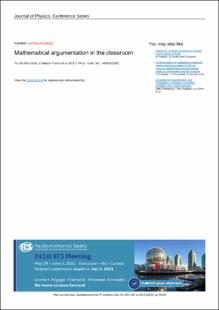Mostrar el registro sencillo del ítem
Mathematical argumentation in the classroom
| dc.contributor.author | Rincón Leal, Olga Lucy | |
| dc.contributor.author | Salazar-Torres, Juan-Pablo | |
| dc.contributor.author | CONTRERAS SANTANDER, YUDITH LILIANA | |
| dc.contributor.author | Valbuena-Prada, Oscar | |
| dc.contributor.author | Gelvez-Almeida, Elkin | |
| dc.contributor.author | Vera, M | |
| dc.contributor.author | Barrera, D | |
| dc.date.accessioned | 2021-11-22T21:00:05Z | |
| dc.date.available | 2021-11-22T21:00:05Z | |
| dc.date.issued | 2019-11-26 | |
| dc.identifier.uri | http://repositorio.ufps.edu.co/handle/ufps/1258 | |
| dc.description.abstract | The article shares some elements of comprehensive type about "mathematical argumentation in the classroom"; whose analysis, was made from two fundamental categories in the development of an oral mathematical argumentation process for the conviction, contradiction and validation of a written mathematical argumentation process. The research addressed two central categories of argumentation as a discursive form, the first one is the epistemic position, and the second one is the discursive position that students unveil at the time of mathematically arguing the solution to a problem situation. The research was developed under the interpretative paradigm through the design of a case study directed by the theory and technique of a focal group, for the collection of information. In the findings, difficulties in the passage were evidenced from the semantic to the theoretical from the epistemic position; regarding the discursive position, the presence of three discursive forms was revealed: description, explanation and argumentation, the latter being the least used by the students. | eng |
| dc.format.mimetype | application/pdf | spa |
| dc.language.iso | eng | spa |
| dc.publisher | Journal of Physics: Conference Series | spa |
| dc.relation.ispartof | Journal of Physics: Conference Series | |
| dc.rights | Content from this work may be used under the terms of the Creative Commons Attribution 3.0 licence. Any further distribution of this work must maintain attribution to the author(s) and the title of the work, journal citation and DOI. Published under licence by IOP Publishing Ltd | eng |
| dc.source | https://iopscience.iop.org/article/10.1088/1742-6596/1408/1/012023/meta | spa |
| dc.title | Mathematical argumentation in the classroom | eng |
| dc.type | Artículo de revista | spa |
| dcterms.references | Salazar J 2017 El modelo de indagación frente al desarrollo de la argumentación escrita. Encrucijadas pedagógicas: Resignificación, emergencias y praxis educativa ed J Hernández (Maracaibo: Ediciones Universidad del Zulia) | spa |
| dcterms.references | Calderón D 2005 Dimensión cognitiva y comunicativa de la argumentación en matemáticas (Colombia: Universidad del Valle) | spa |
| dcterms.references | Perelman C and Tyteca L 1989 Tratado de la argumentación (Madrid: Editorial Gredos) | spa |
| dcterms.references | Duval R 1999 Argumentar, demostrar, explicar: ¿continuidad o ruptura cognitiva? (México: Editorial Iberoamérica) | spa |
| dcterms.references | Duval R 1999 Semiosis y pensamiento humano: Registros semióticos y aprendizajes intelectuales (Colombia: Ediciones Universidad del Valle) | spa |
| dcterms.references | Pierce C 1974 La ciencia de la semiótica: Colección de semiología y epistemología (Buenos Aires: Ediciones Nueva Visión) | spa |
| dcterms.references | Duval R 1999 Proccedings of the Annual Meeting North American Chapter of the International Group for the Psychology of Mathematics Education (Washington: Educational Resources Information Center) Representation, vision and visualization: Cognitive functions in mathematical thinking, basic issues for learning 25 | spa |
| dcterms.references | Krabbe E 2009 Rhetoric and argumentation in the beginning of the XXIst century 6 ed H Ribeiro (Brasil: Universidad de Coimbra) Cooperation and competition in argumentative exchanges 111 | spa |
| dcterms.references | León O and Calderón D 2003 Argumentar y validar en matemáticas: ¿Una relación necesaria? Hacia una comprensión del desarrollo de competencias argumentativas en matemáticas (Colombia: Ediciones Universidad del Valle) | spa |
| dcterms.references | Florez M, Salazar J, Hernández Y, Gelvez E, Garavito J, Florez S, Hernández A and Patiño D 2018 Henry A. Giroux and his contributions to the modeling of critical curriculum: questions and reflections Revista Espacios 39 4 | spa |
| dcterms.references | Simons H 2011 El estudio de caso: teoría y práctica (Madrid: Editorial Morata) | spa |
| dcterms.references | Strauss A and Corbin J 1998 Basics of qualitative research. Techniques and procedures for developing grounded theory (USA: Sage Publications) | spa |
| dc.identifier.doi | 10.1088/1742-6596/1408/1/012023 | |
| dc.publisher.place | Madrid , España | spa |
| dc.relation.citationedition | Vol.1408 No.1.(2019) | spa |
| dc.relation.citationendpage | 7 | spa |
| dc.relation.citationissue | 1 (2019) | spa |
| dc.relation.citationstartpage | 1 | spa |
| dc.relation.citationvolume | 1408 | spa |
| dc.relation.cites | Salazar-Torres, J., Vera, M., Contreras, Y., Gelvez-Almeida, E., Valbuena, O., Barrera, D., & Rincon, O. (2019, November). Mathematical argumentation in the classroom. In Journal of Physics: Conference Series (Vol. 1408, No. 1, p. 012023). IOP Publishing. | |
| dc.relation.ispartofjournal | Journal of Physics: Conference Series | spa |
| dc.rights.accessrights | info:eu-repo/semantics/openAccess | spa |
| dc.type.coar | http://purl.org/coar/resource_type/c_6501 | spa |
| dc.type.content | Text | spa |
| dc.type.driver | info:eu-repo/semantics/article | spa |
| dc.type.redcol | http://purl.org/redcol/resource_type/ART | spa |
| oaire.accessrights | http://purl.org/coar/access_right/c_abf2 | spa |
| oaire.version | http://purl.org/coar/version/c_970fb48d4fbd8a85 | spa |
| dc.type.version | info:eu-repo/semantics/publishedVersion | spa |
Ficheros en el ítem
Este ítem aparece en la(s) siguiente(s) colección(ones)
-
EULER [81]










